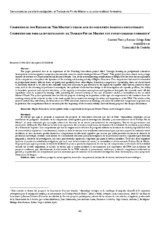Mostrar el registro sencillo del ítem
Competencias para la investigación: el Trabajo Fin de Master y su potencialidad formativa
| dc.contributor.author | Viejo Almanzor, Carmen | |
| dc.contributor.author | Ortega Ruiz, Rosario | |
| dc.date.accessioned | 2018-06-15T10:32:27Z | |
| dc.date.available | 2018-06-15T10:32:27Z | |
| dc.date.issued | 2018 | |
| dc.identifier.issn | 2531-1336 | |
| dc.identifier.uri | http://hdl.handle.net/10396/16951 | |
| dc.description.abstract | El artículo que aquí se presenta es expresión del proyecto de Innovación Docente que bajo el título “Aprendizaje estratégico en las enseñanzas de postgrado: desarrollo de la competencia metacognitiva para la investigación científica y su entrenamiento en el Trabajo Fin de Máster”, se viene realizando por un amplio número de docentes de un máster psicoeducativo de investigación. Una de las aportaciones más interesantes del llamado Plan Bolonia ha sido la incorporación del concepto competencia a la dinámica de la actividad de enseñanza y aprendizaje de la Educación Superior. Las competencias que han de exigirse en los estudios de postgrado difieren en términos de calidad y especificidad de la de otros estudios superiores. Concretamente, cuando se trata de formar a los estudiantes universitarios para que sean capaces de enfrentar tareas científicas, se hace necesario prestar atención a competencias de alto nivel cognitivo que son las que están presentes en tareas de elección de problemas a investigar, dominio en la síntesis de conocimiento relevante para la investigación de un problema concreto, capacidad para formular preguntas y objetivos de investigación, así como para formular supuestos e hipótesis que guíen el trabajo científico. Todo ello debe adquirirse mientras se practica la actividad investigadora, que en el caso de los estudios de máster, se materializa en el denominado Trabajo Fin de Máster. El proyecto que aquí se presenta, ha tenido la finalidad de poner a prueba la adquisición de este tipo de competencias en el tránsito de la actividad docente del modelo asignaturas, al modelo de trabajo que se realiza mediante el asesoramiento y la supervisión del TFM. Los resultados del proyecto confirman que, efectivamente, la elaboración de un TFM estimula el pensamiento autónomo, y eleva la competencia intelectual en general y, en particular, las competencias que son necesarias para el comienzo de la actividad investigadora (tesis doctoral) tal y como propone la Declaración de Bergen. | es_ES |
| dc.description.abstract | The paper presented here is an expression of the Teaching Innovation project titled "Strategic learning in postgraduate education: development of metacognitive competence for scientific research and its training in Master's Thesis". This project has been carried out by a large number of teachers of a Psychoeducational Research Master. One of the most interesting contributions of Bologna Plan has been the incorporation of the competence concept into the dynamics of the teaching and learning activity of Higher Education. The competences that must be demanded in postgraduate studies differ in terms of quality and specificity from other Higher Education competences. Specifically, when we should teach to university students to be able to face scientific tasks, it is necessary to pay attention to the high-level cognitive skills that are present in these tasks, such as the choosing of problems to investigate, the synthesis of relevant knowledge to the investigation of a specific problem, the ability to formulate questions and research objectives, or the capacity to formulate assumptions and hypotheses that guide the scientific work. All this capabilities must be acquired by training, while practicing the research activity; in the case of master's studies, it materializes in the so-called Master's Thesis. The project presented here has had the purpose of testing the acquisition of this type of competences in the transition from the teaching activity of the subjects’ model, to the work model that is carried out through the advice and supervision of the TFM. The results of the project confirm that, effectively, the elaboration of a TFM stimulates autonomous thinking, and raises the intellectual competence in general and, in particular, the competencies that are necessary for the beginning of the research activity (doctoral thesis) proposes the Bergen Declaration. | es_ES |
| dc.format.mimetype | application/pdf | es_ES |
| dc.language.iso | spa | es_ES |
| dc.publisher | UCOPress | es_ES |
| dc.rights | https://creativecommons.org/licenses/by-nc-nd/4.0/ | es_ES |
| dc.source | Revista de innovación y buenas prácticas docentes 5, 46-56 (2018) | es_ES |
| dc.subject | Enseñanza postgrado | es_ES |
| dc.subject | Metacognición | es_ES |
| dc.subject | Desarrollo competencial | es_ES |
| dc.subject | Trabajo fin de máster | es_ES |
| dc.subject | Intervención metodológica | es_ES |
| dc.subject | Higher Education | es_ES |
| dc.subject | Metacognitive skills | es_ES |
| dc.subject | Competential development | es_ES |
| dc.subject | Master Thesis | es_ES |
| dc.title | Competencias para la investigación: el Trabajo Fin de Master y su potencialidad formativa | es_ES |
| dc.title.alternative | Competence for research: The Master’s Thesis and its scientific training potentiality | es_ES |
| dc.type | info:eu-repo/semantics/article | es_ES |
| dc.relation.publisherversion | http://www.uco.es/ucopress/ojs/index.php/ripadoc/index | es_ES |
| dc.rights.accessRights | info:eu-repo/semantics/openAccess | es_ES |

